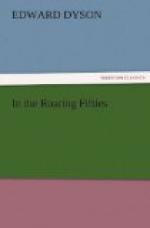Whatever Done’s feelings may have been, neither face nor voice betrayed him. ‘Good-bye,’ he said, and turned away.
She followed him a few paces, and seized his arm.
‘You are not going with unkindness in your heart?’ she pleaded.
‘No,’ he answered. ‘I am very sorry for you.’
‘I want your friendship always.’
It is yours.’
He held her hands in his, and noticed that there were tears upon her cheeks. He was certainly sorry for her; it was pitiful to think that her new happiness had been wrecked in this way, but he could not overcome the coldness that was about him; and so they parted on the spot where a few months earlier Jim had said good-bye with a heart full of love and longing.
XXIV
A bitter time followed with Jim Done. He had rejoined Harry Peetree at Blanket Flat, and continued working there; but his strength returned slowly, and the joy of life had fled from his heart again, leaving him more miserable than he had been as a youth in his native village. In those days his resentments helped to sustain him; he took pride in the spirit with which he faced the enmity of the people, and not a little comfort came to him from the egotism he had cultivated as a refuge from the common contempt. Now the fighting spirit was gone all hatred had gone with it, and his self-confidence had degenerated. For a few weeks after Ryder’s death he made a deliberate effort to stir himself into a state of passionate revolt, dwelling long upon the barbarous sufferings his brother had endured, drawing upon his affection for Mike Burton to stimulate his fading emotions; but he failed to lift himself out of the slough of despond into which he had fallen.
Jim fled from his nurses too early, and the trials he subsequently endured served to retard his restoration. He had pretty good health, without either strength of body or spirit. Half an hour’s work at the windlass wearied him, and this weariness irritated him with a dull, abiding anger. He spent much of his time when not at work lying on his bunk. The life on the field was not different from that which had delighted him at Diamond Gully; there was the same cheerfulness amongst the men, the shanties flared at night, and the diggers roared, and gambled, and drank with no less enthusiasm. He alone was changed.
These moods and the manner of life he was leading fostered a most unhealthy habit of introspection. He was for ever examining his emotions. He thought much about Lucy Woodrow, and of the love he had borne her, but without sorrow for the loss of her. He tried to account for the fact that there was no grief in his heart on Lucy’s accounts whilst keeping Aurora jealously in the background. He was unconsciously dishonest to himself in these self-examinings, and one day this dawned upon him. He laughed over the discovery, laughed aloud at himself, but the amusement was grim.




